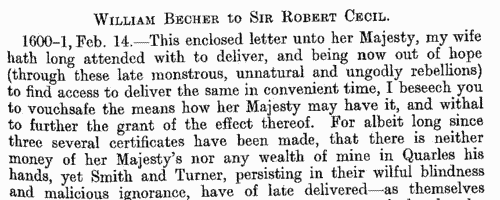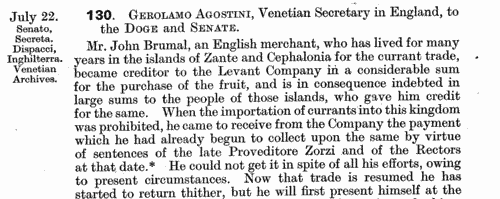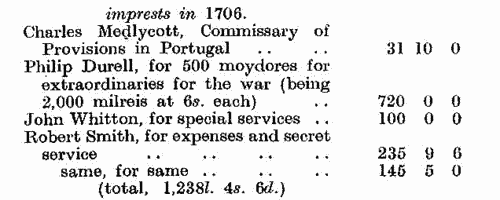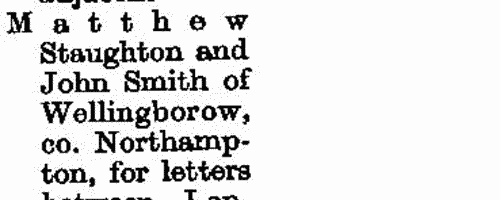Wardlaw Surname Ancestry ResultsOur indexes 1000-1999 include entries for the spelling 'wardlaw'. In the period you have requested, we have the following 144 records (displaying 11 to 20): Single Surname Subscription | | | Buying all 144 results of this search individually would cost £736.00. But you can have free access to all 144 records for a year, to view, to save and print, for £100. Save £636.00. More... |
These sample scans are from the original record. You will get scans of the full pages or articles where the surname you searched for has been found. Your web browser may prevent the sample windows from opening; in this case please change your browser settings to allow pop-up windows from this site. Scottish litigants, rebels and cautioners
(1592-1599)
The Privy Council of Scotland exercised a superior judicial authority in the kingdom, and consequently received and dealt with a constant stream of petitions, as well as dealing with the internal security of the state. This register of the council from August 1592 to May 1599, in the reign of king James VI, was edited by David Masson and published under the direction of the Deputy Clerk Register of Scotland in 1882. The publication brings together the contents of the principal register (Acta Secreti Concilii) with acts and bands (bonds) of caution (surety) from the registers called Acta Cautionis (pp 561-730); Acts and Ordinances relating to the Borders and the North (731-748); and Miscellaneous Privy Council Papers (749-769). Many of the individuals mentioned are the complainants, those of whom they complained, and the sureties on both sides: at this period, many of the complainants are alleging serious attacks, often of a feuding nature. Many of the bonds entered into by the cautioners are promises to keep the peace towards such enemies. Failure to answer to the council when summoned was a serious contempt, leading to being denounced a rebel, with serious consequences.
WARDLAW. Cost: £4.00.  | Sample scan, click to enlarge

| Secretary of State's Papers
(1601)
The letters and papers of sir Robert Cecil, Secretary of State, deal with all manner of government business in England, Ireland and abroad.WARDLAW. Cost: £4.00.  | Sample scan, click to enlarge

| Scottish litigants, rebels and cautioners
(1610-1613)
The Privy Council of Scotland exercised a superior judicial authority in the kingdom, and consequently received and dealt with a constant stream of petitions, as well as dealing with the internal security of the state. This register of the council from July 1610 to February 1613, in the reign of king James VI, was edited by David Masson and published under the direction of the Deputy Clerk Register of Scotland in 1889. The publication starts with the Acta and Decreta, a chronological consolidation of material from Acta Secreti Concilii proper, the Decreta, the Book of Commissions, the Book of Sederunts, the Minute Book of Processes, and The Book of the Isles. There is then a section of Royal and Other Letters (pp. 565-644); then acts and bands (bonds) of caution (surety) from the registers called Acta Cautionis (pp. 647-690); and Miscellaneous Privy Council Papers (693-746). Many of the individuals mentioned are the complainants, those of whom they complained, and the sureties on both sides: at this period, many of the complainants are alleging serious attacks, often of a feuding nature. Many of the bonds entered into by the cautioners are promises to keep the peace towards such enemies. Failure to answer to the council when summoned was a serious contempt, leading to being denounced a rebel, with serious consequences.
WARDLAW. Cost: £4.00.  | Sample scan, click to enlarge

| England and Venice
(1643-1647)
The Master of the Rolls directed the compilation of translations of archives from northern Italy relating to English affairs. This volume, edited by Allen B. Hinds and published in 1926, is largely based on transcripts in the Public Record Office in London of major sources from the Venetian archives, in particular the Dispacci, Inghilterra. Most of this volume consists of the letters of Secretary Agostini from London, the Advices of London forwarded from Paris, and the Esposizioni Principi; and as such contain descriptions of unfolding political events in Britain as seen by Italian diplomats. But there were also Englishmen actively trading with Venice and its sphere of influence in the eastern Mediterranean: Venice was struggling with the Turks for possession of Candia (Crete), and English merchants, mercenaries and ships were involved on both sides. There is even the report of a raid by Barbary pirates on the Cornish coast in which 200 women were carried off for slaves.WARDLAW. Cost: £4.00.  | Sample scan, click to enlarge

| Royalist delinquents in county Durham and Northumberland, their successors, tenants, debtors and creditors
(1648-1660)
King Charles I was executed 30 January 1649, the kingship was abolished and government by a Council of State was established 14 February 1649. Oliver Cromwell became Lord Protector 16 December 1653; died 3 September 1658; and was succeeded by his son Richard, who abdicated 24 May 1659. Charles II was established on the throne 29 May 1660. From 1648 to 1660 parliament sequestrated royalists' estates, restoring many by a process of heavy fines called compounding; this was administered by the Committee for Compounding, working through county committees. These raised considerable amounts of money, money which was vitally necessary for maintaining the parliamentary army's campaigns to subdue opposition in the three kingdoms - England, Scotland and Ireland. The raising and delivery of these monies was the responsibility of the Committee for Advance of Money (C. A. M.). The records of these committees were detailed and extensive, amounting to about 300 volumes, and were calendared for the Public Record Office by Mary Anne Everett Green. Abstracts of the county Durham and Northumberland entries were collated by Richard Welford with a manuscript transcript of the proceedings of the parliamentary commissioners in county Durham surviving in Durham cathedral library, and published by the Surtees Society in 1905. The persons named in these abstracts are not only the delinquents themselves, and those who succeeded them in their estates, but tenants, debtors and creditors, and local constables and officials of the committees.WARDLAW. Cost: £4.00.  | Sample scan, click to enlarge

| Home family archives
(1424-1671)
William Fraser of the Historical Manuscripts Commission examined the archives of the Earl of Home at Hirsel (near Coldstream in Berwickshire), and prepared this calendar, published in 1891.The most detailed account is of 'Documents, more or less of a Personal Nature relating to the Principal Members of the Family of Home' (pp. 87-107), and 'Old Charters and other Documents still in the Charter Chest at Hirsel, relating to Lands formerly possessed by the family' (107-170), with deeds relating to Auldcambus, Aldcathy, Arbirlot, Bedshiel, Bogend, Braidley, Brigham, Brighamshiels, Chirnside, Coldingham, Cowdenknowes, Crailing, Dalswinton, Derington, Dunglas, Eccles priory, Eltrive, Eskdale, Ewesdale, Fogo, Gordon, Greenlaw, Greenwood, Haddington, Harden, Hassington, Hassendean and Horsliehill, Hoscoat, Howlaws, Howpasley, Huntlywood, Jedburgh, Lambden, Lauder, Letham, Leyacres, Luchheild (in Fife), Mawdristoun (Manderston), Maw (in Fife), Mawes (in Perthshire), Mellerstain, East Nisbet, Samuelston, Smailholm, Sprouston, St Bothans (St Bathan), Swynset, Thornton, Tinneis (in Yarrow), and Upsetlington. Fraser was then allowed to inspect the family charters held by their law agent in Edinburgh in nine charter chests, and gives abstracts of the early items that he considered important. This volume also contains his calendar of some of the muniments of the Duke of Athole at Blair Castle, Blair Athole, concentrating on family correspondence from 1473 to 1721: this is also included in this index.WARDLAW. Cost: £4.00.  | Sample scan, click to enlarge

| Treasury Books
(1706-1707)
Records of the Treasury administration in Britain, America and the colonies, for October 1706 to December 1707. These abstracts of the Treasury minute books and corresponding warrants for this period covers a huge variety of topics involving all manner of receipts and expenditure, customs and revenue officials, civil servants, pensioners, petitioners and postmasters figuring particularly among the individuals named.
WARDLAW. Cost: £4.00.  | Sample scan, click to enlarge

| Treasury and Customs Officials, Officers and Pensioners
(1709)
Government accounts, with details of income and expenditure in Britain, America and the colonies
WARDLAW. Cost: £6.00.  | Sample scan, click to enlarge

| Treasury and Customs Officials, Officers and Pensioners
(1710)
Government accounts, with details of income and expenditure in Britain, America and the colonies
WARDLAW. Cost: £6.00.  | Sample scan, click to enlarge

| Treasury and Customs Officials, Officers and Pensioners
(1711)
Government accounts, with details of income and expenditure in Britain, America and the colonies
WARDLAW. Cost: £6.00.  | Sample scan, click to enlarge

|
Research your ancestry, family history, genealogy and one-name study by direct access to original records and archives indexed by surname.
|












